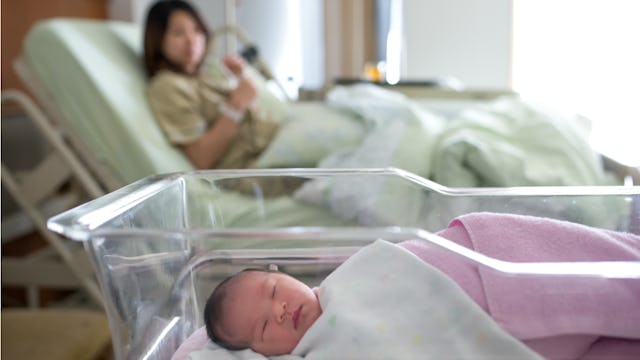Many Nurses Don't Educate Moms About Their Postpartum Health Risks

Most surveyed didn’t realize the maternal death rate has gone up in recent years
The United States has the highest maternal death rate in the developed world. A recent survey of postpartum nurses about their knowledge of the health dangers moms face after giving birth may be one clue as to why our nation’s statistics are so concerning.
NPR reports that a study published in MCN: The American Journal of Maternal/Child Nursing revealed that many of the 372 nurses surveyed were not up to speed when it comes to the health risks new moms face in the days and weeks after giving birth. In fact, only 12 percent of them even knew that the majority of maternal deaths occur in the days and weeks after giving birth.
The study cites a lack of education about potentially dangerous symptoms moms may experience after birth such as swelling, headaches, heavy bleeding, and breathing problems. That lack of knowledge means nurses are missing a chance to possibly lessen the number of maternal deaths in the U.S.
An estimated 700-900 women die of pregnancy-related complications in the U.S. every year. Another 65,000 come close to dying, according to the Centers for Disease Control and Prevention. A CDC analysis also found that nearly 60 percent of the deaths were preventable.
And that’s where nurses come in.
Nearly half of the nurses in the study didn’t realize the maternal mortality rate in the U.S. has gone up in recent years with 19 percent thinking it had declined. Study co-author Debra Bingham, who heads the Institute for Perinatal Quality Improvement and teaches at the University of Maryland School of Nursing, explains why a lack of education for nurses about the maternal mortality rate is a very real problem.
“If [nurses] aren’t aware that there’s been a rise in maternal mortality, then it makes it less urgent to explain to women what the warning signs are,” she explains.
A recent investigation by NPR and ProPublica where women who survived life-threatening complications of pregnancy or childbirth were interviewed revealed that many thought doctors and nurses were slow to note the signs that the they were heading toward a potentially fatal medical event. It’s the nurses who spend more time with moms after birth, and that’s why it’s crucial that they recognize and identify symptoms of postpartum health complications — while teaching moms to do the same once they’re discharged.
And that’s part of the problem — a lack of time spent educating new moms about the things they should watch for in their bodies, as postpartum health issues can effect moms even several weeks after giving birth. The study found that 95 percent of nurses reported a correlation between postpartum education and mortality. But over two-thirds of nurses surveyed spent less than 10 minutes focusing on potential warning signs for moms during the discharge conversation.
Do you remember the discharge steps before leaving the hospital? I can only speak from my own experience, but nurses didn’t tell me much about what to watch for aside from the old “if you fill more than one pad per hour, call us” advice. Most of the discussion centered around the baby’s health and safety. We watched videos about Sudden Infant Death Syndrome and Shaken Baby Syndrome. We learned about the importance of using a car seat properly.
No one told me what kinds of cardiovascular and blood clot risks I could be up against. No one told me what to watch for in myself.
Bingham says there may be a deliberate reason for nurses neglecting to bring that up — it’s too depressing.
“We had some nurses come out and say, ‘Well you know what, I don’t want to scare the woman. This is supposed to be a happy time. I don’t want to seem like all I want to talk about is death,'” she explains.
Yikes.
The good news is that the study is spearheading efforts toward remedying the disconnect between nurses and postpartum moms by providing them with tools to transmit information in a clear-cut, easy to grasp manner. That includes a one-page handout for new moms to bring home so they have a quick reference in case anything seems wrong in their recovery. It also provides instructions for when to consult a doctor or go straight to dialing 911.
Bingham says the tools were tested at four hospitals in 2015 to great success. “Very quickly, we started hearing from the nurses that women were coming back to the hospital with the handout, saying, ‘I have this symptom.'”
While there are a number of factors contributing to our country’s appalling maternal death rate, educated nurses who may be the last point of contact a new mom has before heading home with her baby, could go a long way toward making sure moms stay healthy.
Because we can certainly do better.
This article was originally published on